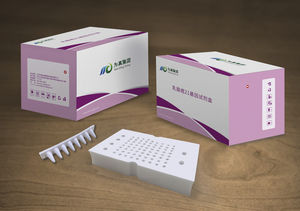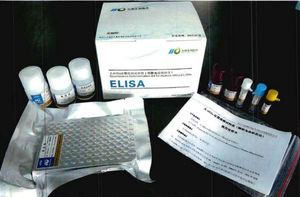
- Laboratory
- Laboratory medicine
- Prostate cancer test kit
- Jiangsu MicroDiag Biomedicine Technology Co., Ltd.

- Products
- Catalogs
- News & Trends
- Exhibitions
Prostate cancer test kit for inflammatory diseasesoncologyPSA
Add to favorites
Compare this product
Characteristics
- Applications
- for prostate cancer, for inflammatory diseases
- Application field
- oncology
- Tested parameter
- PSA
- Sample type
- tissue
- Analysis mode
- for PCR, fluorescence
Description
PCA3, the new prostate cancer antigen 3, is a non-coding messenger ribonucleic acid (mRNA) fragment located on chromosome 9 (9q21-22). The full length of PCA3 is about 25kb, including 4 exons and 3 introns. In 1995, a joint study by Johns Hopkins Hospital (Baltimore) and Radboud University (Nijmegen, Netherlands) found that the mRNA of prostate tissue is highly specific in prostate cancer. expression.
【expected usage】
It is used to detect the expression of human PCA3 gene and PSA gene. By calculating the ratio of the expression of human PCA3 gene and PSA gene, it can assist clinical diagnosis of prostate cancer malignant disease or benign disease such as prostate hyperplasia and inflammation.
【Product advantages】
For the auxiliary diagnosis of prostate cancer. The traditionally used PSA is not a specific molecular marker for prostate cancer. There are clinical problems of false positives and over-diagnosis and treatment, which increase unnecessary puncture and economic and psychological burden of patients. PCA3 is not only tissue-specific (ie, organ (prostate) specificity, only expressed in prostate tissue), but also tumor-specific (PCA3 gene is specifically and highly expressed in prostate cancer, and its expression is normal tissue or benign lesions 66 times of tissue), it is not affected by inflammation, age and volume, so it is more suitable as a specific biomarker for prostate cancer.
Other Jiangsu MicroDiag Biomedicine Technology Co., Ltd. products
Scientific
Related Searches
- Assay kit
- Blood assay kit
- Serum assay kit
- Immunoassay assay kit
- Plasma assay kit
- Molecular test kit
- Optical assay kit
- Fluorescence assay kit
- ELISA assay kit
- Oncology test kit
- Cell assay kit
- Genetic test kit
- Tissue detection kit
- PCR assay kit
- Oncology test kit
- Liver disease assay kit
- Genetic mutation detection kit
- Inflammatory disease assay kit
- Tumor marker test kit
- Colorectal cancer test kit
*Prices are pre-tax. They exclude delivery charges and customs duties and do not include additional charges for installation or activation options. Prices are indicative only and may vary by country, with changes to the cost of raw materials and exchange rates.



